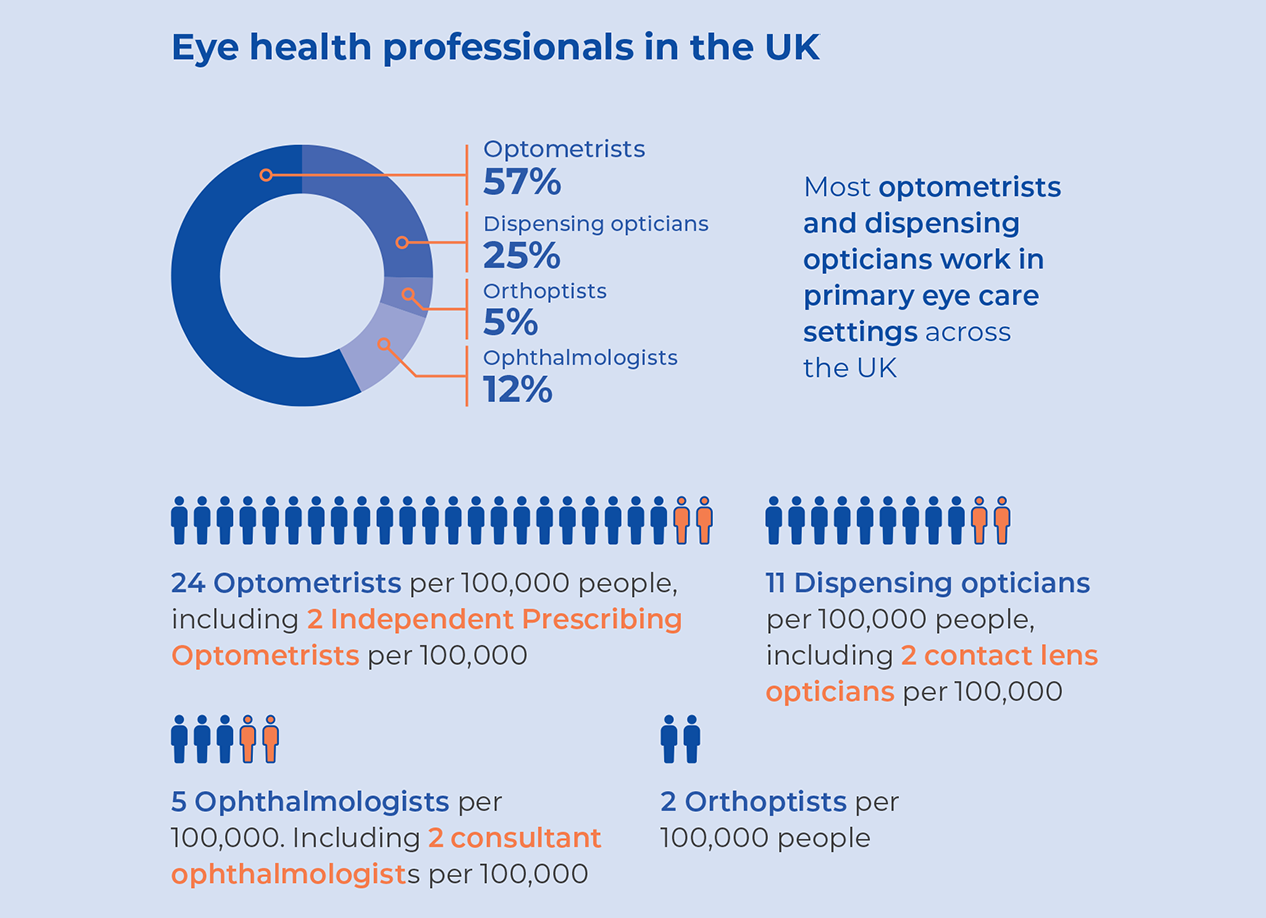- Primary eye care in Northern Ireland provides more than 826,000 appointments each year, including sight tests, enhanced eye care services and contact lens care appointments [1]
- Secondary care provides about 83,000 appointments each year [2]
In Northern Ireland, the Health Service (HS) sets out who is eligible for a HS-funded eye examination. This eye examination is provided as part of General Ophthalmic Services (GOS).
All other adults must pay for a private eye examination and do not get any help from the HSE towards the cost of prescription glasses.
In addition to GOS-funded eye examinations, the Health & Social Care Board (HSCB) has commissioned a number of regional enhanced services aimed at improving access and outcomes and delivering care closer to home.
Enhanced services include regional acute eye, glaucoma and cataract pathways. Glaucoma pathways can include repeat measure, enhanced case finding, and OHT monitoring. eReferral, access to Electronic Care Record and Project ECHO has made this possible. A NI Eyecare Network is also now constituted to make regional decisions, with a mandate to advise on prioritised investments across primary and secondary eye care.
Local Health and Social Care Trusts provide the HES and report to the HSCB.
FODO members provide most primary eye care services in Northern Ireland and FODO works closely with Optometry Northern Ireland to advance eye health and eye care across the whole of Northern Ireland.
Optometrists and dispensing opticians comprise the largest regulated workforce in eye care, followed by ophthalmologists and orthoptists.*

Primary care optometrists are also qualified to manage a large and complex caseload. The table below provides an overview of the competencies and qualifications of primary care optometrists.
The section below provides an overview of eye health professionals and how they are regulated.
Regulated by the General Optical Council. Optometrists perform detailed eye examinations to detect defects in vision, ocular disease or other health issues. Many now also perform advanced diagnostic tests and co-manage patients with eye conditions. They form the single largest group of eye care professionals in the UK.
Dispensing opticians
Regulated by the General Optical Council. Dispensing opticians can fit and supply spectacles to children and adults and can advise on and dispense low vision aids. With additional specialist training they can also fit contact lenses and examine the anterior eye for defects and ocular disease.
Orthoptists
Regulated by the Health and Care Professions Council. Orthoptists specialise in diagnosing and treating visual problems involving eye movements. They might have other roles and responsibilities. They typically work in hospital eye clinics but can also work in community settings - for example, when screening in schools.
Ophthalmologists
Regulated by the General Medical Council. Ophthalmologists are medically trained doctors who specialise in eye health. They often do a mix of surgical and non-surgical work, and as they build more experience they typically specialise in a specific sub-speciality, with Health Education England noting eight subspecialty areas in 2019
- Cornea and anterior segment
- Medical retina
- Glaucoma
- Oculoplastic surgery (plastic surgery around the eye)
- Paediatric ophthalmology
- Surgical retina (vitreo-retinal surgeons)
- Primary care
- Medical and neuro-ophthalmology.
References
[1] FODO, The future of primary eye care - principles and priorities https://www.fodo.com/flipbooks/FODO-Strategy-Document-Full-2023/. Each year practices in Northern Ireland provide 680,000 sight tests, 26,467 enhanced eye care appointments and an estimated 120,000 contact less appointments (based on 3% of contact lens users in the UK living in Northern Ireland and visiting at least once per year). Excluding visits for repeat tests and advanced diagnostics, a conservative estimate is that 826,000 clinical appointments are offered each year.
[2] FODO, The future of primary eye care - principles and priorities https://www.fodo.com/flipbooks/FODO-Strategy-Document-Full-2023/.
*This shows the current split of the workforce within the UK.

 Patients and public
Patients and public
 Policymakers
Policymakers Members
Members News and views
News and views

